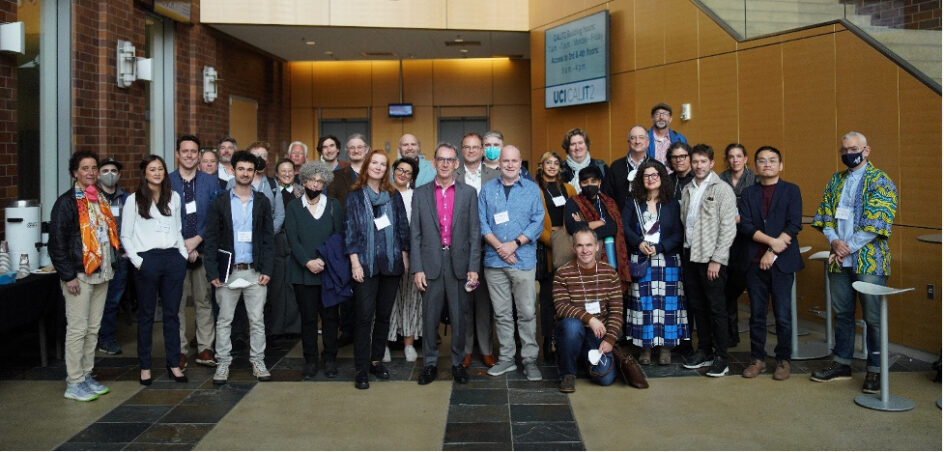Tribute to Geoffrey Bowker Brings Together Scholarly Community
On Jan. 13–14, 2023, an eclectic group of scholars gathered at UC Irvine’s Donald Bren School of Information and Computer Sciences (ICS) for a two-day celebration of Emeritus Donald Bren Chair Geoffrey Bowker. The affectionately nicknamed “Bowkerfest,” hosted by the UCI Department of Informatics and Evoke Lab, included a talk by the guest of honor as part of the distinguished lecture series for UCI’s Steckler Center for Responsible, Ethical, and Accessible Technology (CREATE).
“People traveled from far and wide — and from many different disciplines — to honor Geof,” says Paul Dourish, Chancellor’s Professor of Informatics and director of CREATE. “This is a mark not only of how much he meant to everyone as both a friend and a scholar, but also of the remarkable breadth of his influence.”

An Influential and Provocative Scholar
Bowker is widely known for Sorting Things Out: Classification and its Consequences, a landmark book he co-authored with the late Susan Leigh Star in 1999. In 2019, a conference — “A Book Defying Classification: Sorting Things Out’s Legacy, 20 Years After” — was dedicated to its influence on science and technology studies and on sociology more generally.
“I came to his work via information science and a chapter in Sorting Things Out about racial classifications,” says Informatics Professor Roderic Crooks, principal investigator of the Evoke Lab. “Reading it shocked me. I had no idea research could speak to politics, technology, art, life and the world in that way. It was my great honor to come to work at UC Irvine with Geof.”
Bowker came to UCI in 2012, with an impressive academic background that included conducting cyberscholarship research at the University of Pittsburgh’s iSchool; serving as executive director of the Center for Science, Technology and Society at Santa Clara University; and chairing the Department of Communication at UC San Diego. He earned his Ph.D. in the history and philosophy of science from the University of Melbourne in 1984 and became a renowned researcher, focusing on the use of the web and other digital resources across a set of disciplines.
“Geof’s scholarship, which bridges and breaks disciplines with both reverie and provocation, greatly influences my work in terms of the curiosities I pursue, the voice that I express, and the commitments I stand by,” says Ph.D. candidate Benedict Olgado, who is advised by Bowker and Crooks. “As Geof’s last advisee I, of course, wanted to help in putting together a tribute that not only highlights his impressive career and rich scholarship, but one that really celebrates the scholarly community he has nurtured throughout his years as a mentor and colleague.”
The Bowkerfest
Crooks and Olgado worked together to organize the event in coordination with Associate Professor Steve Jackson of Cornell, Associate Professor David Ribes of the University of Washington, and Assistant Professor John Seberger of Drexel. The event included sessions on “Bowkerian Provocations,” “Wisdom of the Bowker,” and “Bowkers of a Feather.” In the CREATE lecture, “The End of Computing,” Bowker discussed three broad rubrics for tracking the history and future of computing.
He began with classification and then looked at computing and time, arguing that humans are moving into uncharted ontological territory. He went on to explore computing and nature, analyzing several attempts to naturalize the computer and noting that “we’re building a world together with the machines.” He concluded with grounds for optimism: “We don’t recognize the real beauty and change that is absolutely possible at the moment.”
Carl DiSalvo, associate professor in the College of Computing at Georgia Institute of Technology, was thrilled to be a part of the celebration. “Not only was it a wonderful gift to Geof, it was also a wonderful gift to all of us who attended,” he says. “It was an opportunity to reconnect, to build community, and to reflect on what’s important and exciting in our work.”
Olgado echoed that sentiment. “The highlight really was having many of Geof’s closest friends, colleagues and mentees through the years come together building community, exchanging ideas and having fun all in celebration of Geof,” he says. “His CREATE lecture was also [a] classic Bowkerian piece of provocation and play, while hinting on what’s next, because Geof ain’t stopping any time soon!”
Life at the Femtosecond
Bowker, who officially retired in 2021, appreciated the celebratory gathering. “The event was amazing — lots of friends whose work I love,” he says. “Many didn’t know each other, but the mix was right. Special thanks to the local organizers Bono Olgado and Roderic Crooks.”
All in attendance look forward to Bowker’s continued work and influence. “The whole event was not just a touching and inspiring celebration of Geof’s achievements,” admits Dourish, “but also a demonstration of why we hope that he’ll remain a very active and engaged emeritus professor!”
Bowker seems poised to do just that. “I know of a few jobs where no one ever seems to retire — academia and psychoanalysis among them (there used to be being a pope as well),” he says. “So I’m reading as ever, planning on writing more.” He will be residing in the Bay Area, focusing on his current research into time and computing under the rubric “life at the femtosecond.”
— Shani Murray